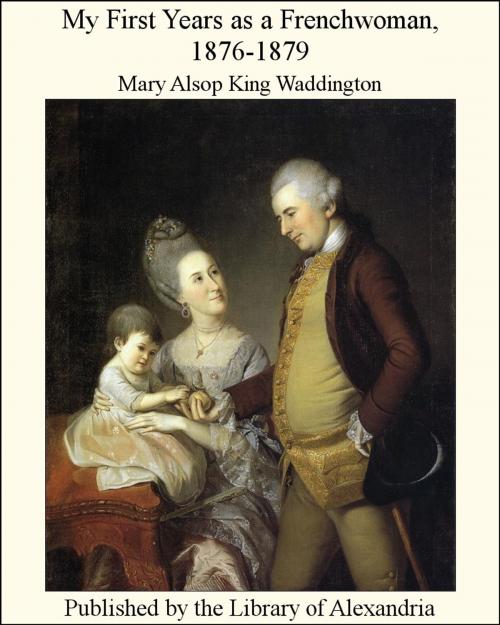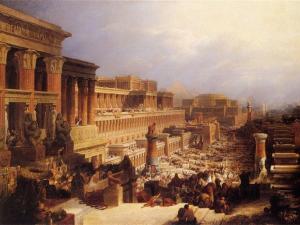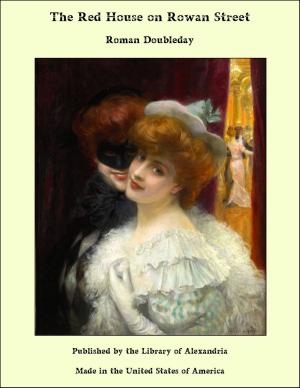My First Years as a Frenchwoman, 1876-1879
Nonfiction, Religion & Spirituality, New Age, History, Fiction & Literature| Author: | Mary Alsop King Waddington | ISBN: | 9781465517975 |
| Publisher: | Library of Alexandria | Publication: | March 8, 2015 |
| Imprint: | Language: | English |
| Author: | Mary Alsop King Waddington |
| ISBN: | 9781465517975 |
| Publisher: | Library of Alexandria |
| Publication: | March 8, 2015 |
| Imprint: | |
| Language: | English |
WHEN MACMAHON WAS PRESIDENT I was married in Paris in November, 1874, at the French Protestant Chapel of the rue Taitbout, by Monsieur Bersier, one of the ablest and most eloquent pastors of the Protestant church. We had just established ourselves in Paris, after having lived seven years in Rome. We had a vague idea of going back to America, and Paris seemed a first step in that direction—was nearer New York than Rome. I knew very little of France—we had never lived there—merely stayed a few weeks in the spring and autumn, coming and going from Italy. My husband was a deputy, named to the National Assembly in Bordeaux in 1871, by his Department—the Aisne. He had some difficulty in getting to Bordeaux. Communications and transports were not easy, as the Germans were still in the country, and, what was more important, he hadn't any money—couldn't correspond with his banker, in Paris—(he was living in the country). However, a sufficient amount was found in the country, and he was able to make his journey. When I married, the Assembly was sitting at Versailles. Monsieur Thiers, the first President of the Republic, had been overthrown in May, 1873—Marshal MacMahon named in his place. W.[1] had had a short ministry (public instruction) under Monsieur Thiers, but he was so convinced that it would not last that he never even went to the ministry—saw his directors in his own rooms. I was plunged at once into absolutely new surroundings. W.'s personal friends were principally Orleanists and the literary element of Paris—his colleagues at the Institute. The first houses I was taken to in Paris were the Ségurs, Remusats, Lasteyries, Casimir Périers, Gallieras, d'Haussonville, Léon Say, and some of the Protestant families—Pourtalès, André Bartholdi, Mallet, etc. It was such an entirely different world from any I had been accustomed to that it took me some time to feel at home in my new milieu. Political feeling was very strong—all sorts of fresh, young elements coming to the front. The Franco-German War was just over—the French very sore and bitter after their defeat. There was a strong underlying feeling of violent animosity to the Emperor, who had lost them two of their fairest provinces, and a passionate desire for the revanche. The feeling was very bitter between the two branches of the Royalist party, Legitimists and Orleanists. One night at a party in the Faubourg St. Germain, I saw a well-known fashionable woman of the extreme Legitimist party turn her back on the Comtesse de Paris. The receptions and visits were not always easy nor pleasant, even though I was a stranger and had no ties with any former government. I remember one of my first visits to a well-known Legitimist countess in the Faubourg St. Germain; I went on her reception day, a thing all young women are most particular about in Paris. I found her with a circle of ladies sitting around her, none of whom I knew. They were all very civil, only I was astonished at the way the mistress of the house mentioned my name every time she spoke to me: "Madame Waddington, êtes-vous allée à l'Opéra hier soir," "Madame Waddington, vous montez à cheval tous les matins, je crois," "Monsieur Waddington va tous les vendredis à l'Institut, il me semble," etc. I was rather surprised and said to W. when I got home, "How curious it is, that way of saying one's name all the time; I suppose it is an old-fashioned French custom. Madame de B. must have said 'Waddington' twenty times during my rather short visit." He was much amused. "Don't you know why
WHEN MACMAHON WAS PRESIDENT I was married in Paris in November, 1874, at the French Protestant Chapel of the rue Taitbout, by Monsieur Bersier, one of the ablest and most eloquent pastors of the Protestant church. We had just established ourselves in Paris, after having lived seven years in Rome. We had a vague idea of going back to America, and Paris seemed a first step in that direction—was nearer New York than Rome. I knew very little of France—we had never lived there—merely stayed a few weeks in the spring and autumn, coming and going from Italy. My husband was a deputy, named to the National Assembly in Bordeaux in 1871, by his Department—the Aisne. He had some difficulty in getting to Bordeaux. Communications and transports were not easy, as the Germans were still in the country, and, what was more important, he hadn't any money—couldn't correspond with his banker, in Paris—(he was living in the country). However, a sufficient amount was found in the country, and he was able to make his journey. When I married, the Assembly was sitting at Versailles. Monsieur Thiers, the first President of the Republic, had been overthrown in May, 1873—Marshal MacMahon named in his place. W.[1] had had a short ministry (public instruction) under Monsieur Thiers, but he was so convinced that it would not last that he never even went to the ministry—saw his directors in his own rooms. I was plunged at once into absolutely new surroundings. W.'s personal friends were principally Orleanists and the literary element of Paris—his colleagues at the Institute. The first houses I was taken to in Paris were the Ségurs, Remusats, Lasteyries, Casimir Périers, Gallieras, d'Haussonville, Léon Say, and some of the Protestant families—Pourtalès, André Bartholdi, Mallet, etc. It was such an entirely different world from any I had been accustomed to that it took me some time to feel at home in my new milieu. Political feeling was very strong—all sorts of fresh, young elements coming to the front. The Franco-German War was just over—the French very sore and bitter after their defeat. There was a strong underlying feeling of violent animosity to the Emperor, who had lost them two of their fairest provinces, and a passionate desire for the revanche. The feeling was very bitter between the two branches of the Royalist party, Legitimists and Orleanists. One night at a party in the Faubourg St. Germain, I saw a well-known fashionable woman of the extreme Legitimist party turn her back on the Comtesse de Paris. The receptions and visits were not always easy nor pleasant, even though I was a stranger and had no ties with any former government. I remember one of my first visits to a well-known Legitimist countess in the Faubourg St. Germain; I went on her reception day, a thing all young women are most particular about in Paris. I found her with a circle of ladies sitting around her, none of whom I knew. They were all very civil, only I was astonished at the way the mistress of the house mentioned my name every time she spoke to me: "Madame Waddington, êtes-vous allée à l'Opéra hier soir," "Madame Waddington, vous montez à cheval tous les matins, je crois," "Monsieur Waddington va tous les vendredis à l'Institut, il me semble," etc. I was rather surprised and said to W. when I got home, "How curious it is, that way of saying one's name all the time; I suppose it is an old-fashioned French custom. Madame de B. must have said 'Waddington' twenty times during my rather short visit." He was much amused. "Don't you know why















